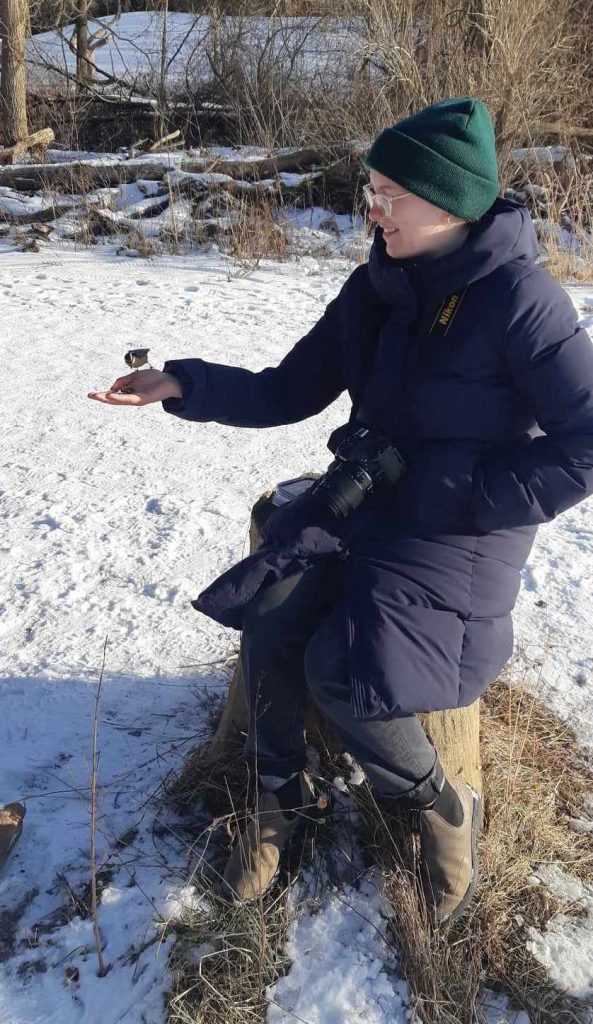For our next installment of our Feminist Bioethics Scholar Spotlight Series, we have Nicole Fice, PhD, Assistant Professor at Trent University. Read on to learn more about Nicole and her work.
What drew you to bioethics? In other words, what’s your bioethics origin story?
My first undergraduate course in philosophy was an introduction to moral and political philosophy, and immediately I was hooked. My focus on bioethics didn’t come until later in my undergraduate career, when I took a fourth-year advanced topics course on conscientious objections in medicine at Trent University with Dr. Michael Hickson. My paper for that course examined whether parents who refuse pediatric vaccines on behalf of their children where a kind of conscientious objector. I knew back then I was interested in graduate studies in philosophy, so I used that paper for my applications to graduate programs.
The ethics and politics of vaccine hesitancy stuck with me—in my MA research project and parts of my PhD dissertation I continued to grapple with philosophical questions related to vaccine hesitancy and became especially interested in what a feminist perspective could bring to the issue. My thoughts on the topic have changed over the years and continue to evolve, but it’s fun to look back and see that that fourth-year undergraduate paper was really my bioethics origin story! My work on vaccine hesitancy pushed me to focus on public health ethics, and now I teach that same fourth-year advanced topics course on public health ethics.
Image of Nicole Fice, sitting on a tree stump and holding a bird in the snow, courtesy of Dr. Fice.

What next directions in your research are you most excited about?
I was recently awarded a small grant to begin a new project on the ethics of homelessness, so that is definitely what I am most excited about at the moment! Interestingly, it is an issue that hasn’t received much attention from philosophers or bioethicists, but I think it raises lots of challenging questions, including ones relevant to public health ethics.
Right now, the project is divided into two parts: the first part is writing a paper that responds to some recent philosophical work on homelessness and autonomy, which I’ll be presenting at the North American Society for Social Philosophy. The second part is a more public-facing project that analyzes the ethics of a By-law in my city that essentially criminalizes tenting in public parks, which primarily impacts those experiencing homelessness.
My goal is to produce a report for local service providers and advocacy groups in the city that argues this particular By-law, and others like it, are morally problematic for a variety of reasons. For this part of the project, I’ve been meeting with awesome organizations like One City Peterborough that provide services and do a lot of advocacy surrounding issues like homelessness, so I am excited to continue to learn from them and collaborate on some public events on the ethics of homelessness in my city.
What’s a favorite think you do outside of bioethics that you can share with us?

When I have time, I love to craft! It helps to keep my hands busy and exercise my creativity. Knitting, embroidery, and pottery are among some of the crafts I’ve learned. Among those, I think pottery is my favourite, although it is the one I find the most difficult and the one that requires the most technical resources. During my PhD, I was a member of a community studio where I learned to throw pottery on the wheel. Getting my hands dirty was a great way to relieve some stress! Unfortunately, I haven’t joined a new community studio since moving to a new city, but I have been trying to keep up with some of my other crafts like knitting. I hope to return to pottery soon! Image of pottery cup and teapot courtesy of Nicole Fice.
What’s something published in the last few years that you’re excited about or found really helpful?
I recently read Barrett Emerick and Audrey Yap’s new book, Not Giving Up on People: A Feminist Case for Prison Abolition. Although they are writing about prison abolition, I saw many of their ideas and arguments as being relevant to both theoretical and practical issues I focus on in my work on public health ethics, including homelessness. One aspect of their book that made me think a lot was their discussion of moral solidarity and moral abandonment, terms they draw on from philosopher Jean Harvey. They describe moral solidarity as “taking up an attitude of respect and concern for other people; it is fundamentally about recognition, perceiving and understanding them in their circumstances, and meeting them where they are” (27).
This conception of solidarity is interesting to me given that many others (including Meena Krishnamurthy and Angus Dawson and Bruce Jennings) have argued that solidarity of some kind ought to be an essential component of theorizing in public health ethics. One thing I’m interested in is comparing the accounts of solidarity that have been given in the context of public health ethics and comparing it to various public health issues to think about which account is most appropriate and why.
Overall, what really stood out to me in Emerick and Yap’s work is their conception of moral abandonment. Following Harvey, they describe moral abandonment as the alternative to moral solidarity, which “[leaves] the victim of injustice further isolated, degraded, and diminished within the larger moral community” (28). In their book, they argue against moral abandonment and the ways in which incarceration institutionalizes moral abandonment because it is “a way of giving up on people as a society” (88).
While I don’t have the space to fully summarize their arguments or develop my views here, I want to mention a few things I continue to think about in relation to their arguments on moral abandonment. The first is an experience I’ve had when teaching my fourth-year class on public health ethics. In that class, we have one week that covers homelessness and another week that covers harm reduction and drug addiction. I think these are the two most controversial topics I’ve ever taught—and I teach a lot of controversial topics, including oppression, privilege, pornography, etc.! I think of these topics as controversial given some of the reactions I get from (some, not all) students. A few students, when discussing the ethical issues related to homelessness or drug addiction, seem to have an attitude that indicates they have given up on people who are homeless or people who use drugs. Emerick and Yap’s book, along with Harvey’s work, helped me understand that attitude as expressing a kind of moral abandonment, which is largely informed by pervasive social stigmas and negative stereotypes about people experiencing homelessness or people who use drugs (who are, going back to Emerick and Yap’s focus on incarceration, often criminalized).
This relates to a second thought I had reading their book, which is how to address such attitudes when they arise, especially in my own teaching. This is something they discuss in later chapters of their book, too. For my own purposes, one thing I might test out next year is assigning some of Emerick and Yap’s book to read when we cover homelessness and drug addiction. A final thing I continue to think about is how public health ethics generally and public health policymakers in particular might have to address moral abandonment.
One question I had was whether are there ways in which public health or other social policies institutionalize moral abandonment in the same way incarceration does. This seems plausible to me: some examples might include the By-law I mentioned above, which essentially criminalizes homelessness. If the By-law in part functions merely to evict people sleeping in tents from public parks and does not offer meaningful alternatives to better their situation, it might look like the city is giving up on people experiencing homelessness. Should public health experts and policymakers argue against such approaches? What would advocating for shifts away from moral abandonment in public health and social policy making look like? Taking inspiration from Emerick and Yap, I think these questions are ones I’ll continue to think about and work on moving forward!

